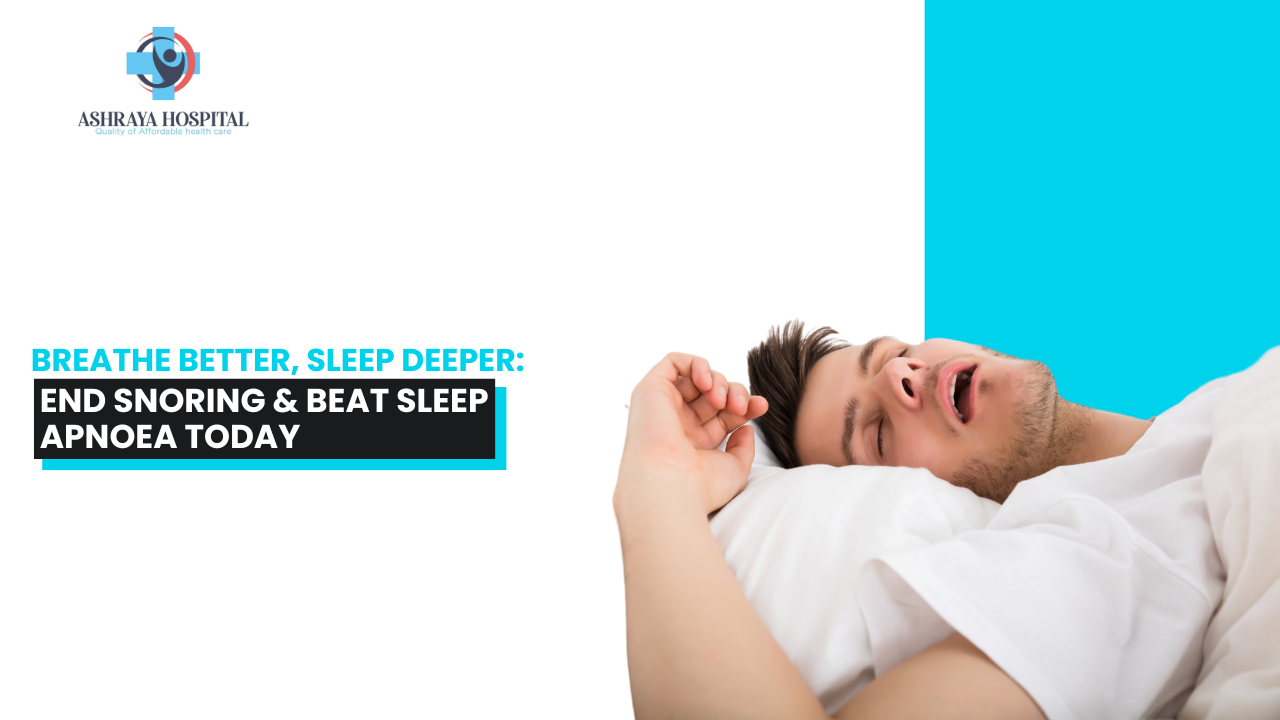



Do you or your partner struggle with snoring at night? While snoring might seem harmless, it could be a sign of something more severe: sleep apnoea. A recent report revealed that 100 million people worldwide are affected by sleep apnoea, a common but often undiagnosed sleep disorder. If you are waking up feeling tired, even after a full night’s sleep, it’s time to consider how sleep apnoea might be affecting your rest.
Read on to learn what sleep apnoea is, how it connects with snoring, common symptoms, and effective treatments to help you stop snoring and sleep better.
Sleep apnoea is a sleep disorder that can lead to interrupted breathing while you are asleep. The halts in breathing can last for a few seconds or minutes and can happen many times throughout the night. The most familiar type of sleep apnoea is obstructive sleep apnoea (OSA), which happens when the muscles at the back of the throat relax, causing a blockage in the airway. Another type is central sleep apnoea, which happens when the brain fails to transmit the signal to the muscles to breathe. Finally, there is complex sleep apnoea, which is a combination of both types.
It is important to know that sleep apnoea is not just about snoring. The breathing interruptions can seriously impact your health, causing low oxygen levels in your blood, leading to a range of potential health complications.
Snoring happens when there is a partial blockage of the upper airway, causing the tissues in your throat to vibrate. While snoring is often harmless, it is one of the most common signs of sleep apnoea. If you snore loudly and frequently, it could be an indicator that your airway is being partially blocked during sleep, a hallmark of obstructive sleep apnoea.
When someone has sleep apnoea, the airway may completely collapse, leading to pauses in breathing. This airflow disruption is often followed by gasping or choking as the body struggles to restore normal breathing. If you or your partner notice loud snoring paired with choking, gasping, or pauses in breathing, this could be a strong indication of sleep apnoea.
Here are the common symptoms of sleep apnoea that you should watch for:
If you notice any of these symptoms, it is important to seek a consultation with an expert to determine if sleep apnoea is the cause.
Sleep apnoea is more than just a nuisance – it is a serious condition that can have far-reaching health consequences. If left untreated, it can boost your risk of developing heart disease, high BP, stroke, diabetes, and even obesity. Sleep apnoea can also lead to poor mental health, affecting your mood and cognitive abilities.
If you are interested in learning more about the risks of untreated sleep apnoea, be sure to check out our dedicated "What Are the Risks of Untreated Sleep apnoea?".
Treating sleep apnoea can improve your quality of life by ensuring better sleep, enhancing your energy levels, and reducing your risk of developing these associated health conditions. The good news is that sleep apnoea can be managed effectively with the proper treatment, leading to improved sleep and overall well-being.
If you or someone you know struggles with snoring or suspects sleep apnoea, it’s essential to take proactive steps to manage the condition. Addressing sleep apnoea not only helps reduce snoring but also ensures you get the restful, quality sleep your body needs. Here are some effective lifestyle changes, medical treatments, and expert solutions that can help you regain better sleep and overall health:
Consulting a Specialist: If you suspect you have sleep apnoea, the first step is to see a doctor. They can help determine your condition and recommend the best course of treatment. Whether you need a CPAP machine, oral appliance, or another solution, the expert will guide you to the right treatment to help you sleep better.
To support your sleep apnoea treatment, here are a few tips for better sleep hygiene:
In summary, snoring could be an early sign of sleep apnoea, a severe condition that affects your health. Recognising symptoms like loud snoring, daytime fatigue, and choking during sleep is key to seeking timely treatment. With lifestyle changes, medical treatments, and good sleep hygiene, you can improve your sleep quality.
If you suspect sleep apnoea, consulting a specialist is crucial. Early intervention can help prevent long-term health concerns and restore restful sleep.
Are you or a loved one experiencing symptoms of sleep apnoea or snoring? Don’t wait for it to get worse. Meet with our expert specialists, Dr Mohan K. T. or Dr Amit Koli, or Dr. Vishnukant Jadhav at Ashraya Pulmonology, Allergy, and Snoring Clinic, to get a comprehensive diagnosis and explore effective treatment options. Take the first step towards better sleep and improved health today. Book your appointment now and start your journey to restful nights.
Watch this insightful video, “Sleep apnoea| Episode 54” of Dr. Mohan K.T, with Shark Tank fame, Namita Thapar, discussing the impact of sleep apnoea and how it can be treated. Click here to watch the video.